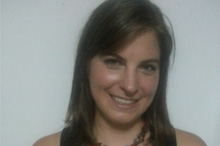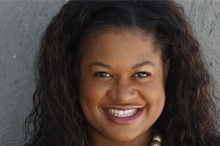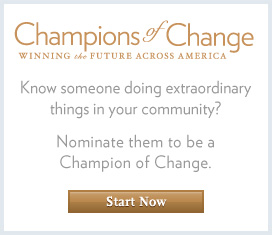Champions of Change Blog
Our Future Needs: All Hands On Deck
Posted by on August 12, 2013 at 10:18 AM EDT
Theresa Freet is being honored as a Champion of Change for her work to expand opportunities for young learners from communities historically underserved or underrepresented in tech fields.
Education has always been a central part of my work. I believe wholeheartedly that knowledge is power. And that such power should belong to everyone.
As I became more interested in technology, it became clear that understanding computers and having the skills to code are very powerful tools in changing an individual’s prospects, and in changing the world. Technology impacts all areas of life and the people writing the code for how that technology works are determining our future. It just made sense to me that those people must be as diverse and wide a group as possible in order to harness to full potential of how technology can serve the world.
I started working with CodeMontage and Developers for Good because of Vanessa Hurst, the founder of both organizations and a lifelong friend. She always says, “Software is about humanity. It’s about helping people by using computer technology.” That resonated with me. However, I worried, like many others, that the uniformity of voices meant that software was not helping as many people as it could, or benefiting from the variety of perspectives that leads to innovation.
With CodeMontage, I work to give individuals better access to technology and to encourage those voices already in the technology sector to become more vocal leaders and community contributors. We’re working to get more variety in the field, and to better prepare all of these enthusiastic individuals for careers in computing and lifetimes of harnessing the power of their skills for good. CodeMontage recently led the Code Day at Write Speak Code, an annual action-based conference designed to give women developers the skills and confidence to be thought leaders and visible advocates in technology. By encouraging underrepresented voices to speak up more noticeably and teaching young women more about computer software, through projects like a course at Barnard College in New York City, we’re hoping to erase the disparities in the tech industry.
Including more voices in technology is challenging and will require sweat, strength, and creativity. However, there is no question to me that we need everyone working to create new technology and design its uses. All the challenges of the future, from healthcare to food systems, climate change to poverty relief, can benefit tremendously from the power of technology. More importantly, technology will become increasingly more powerful and impactful as we include more voices.
Theresa Freet is an Organizer for Developers for Good.
Learn more about TechnologyBuilding a True Pipeline for Young Women in Tech - at Scale and with Urgency
Posted by on August 12, 2013 at 10:03 AM EDT
Ruthe Farmer is being honored as a Champion of Change for her work to expand opportunities for young learners from communities historically underserved or underrepresented in tech fields.
“It is really great to be recognized for something that I love and work hard at. It can be difficult sometimes being the only girl in the technology department at my small school. Meeting other girls who share my interests is great and this award gives me confidence in my ability to succeed in a field that I love so much. Thank you.” ~ NCWIT Award for Aspirations in Computing Recipient
Notes like this give me energy. Hearing from a young woman that your work has had an impact on her life is priceless. Fortunately for me, notes like this are pretty frequent of late. But, they are also eerily consistent. Two salient bits in this short statement and so many others like it perfectly illuminate both the challenge and the solution for young women in technology – recognition and community.
In the technology education space we talk a lot about the education and workforce talent “pipeline” and all the “leaks” along the way that contribute to the attrition of women. I believe this analogy is incorrect. A pipeline implies that the system is designed as a conduit, meaning the basic purpose of flow is still happening, and that though the leaks diminish the overall output and efficiency of the system – it is nonetheless a linear system. The experience for girls in technology is a lot more like an obstacle course. There are pitfalls, like attending a school that doesn’t offer any meaningful computer science courses (the bulk of U.S. schools don’t) or growing up in a state where computer science and IT courses don’t count (only 10 U.S. States count computer science as satisfying a math or science graduation requirement). Then, obstacles like walking into a tech class as a freshman and being the only girl, non-inclusive curriculum, and even overt incidences of bias. Top that off with a consistent headwind of negative stereotypes about technology fields and the people in them. It is a wonder any young woman survives this educational equivalent of “wipeout.” Consequently, those that make it through exemplify a tremendous amount of determination and passion.
I’ve been working on tech inclusion since 2001. In fact, I’ve been at this long enough to see girls participating in a Robotics Day Camp at 12 grow up to become interns at top tech companies, graduate college, and generally make me proud. When I joined Girl Scouts I jumped at the chance to pilot an Intel sponsored engineering program for girls and appointed myself the council tech/engineering specialist (I resisted the term STEM and still do). I’ve implemented numerous related programs: Lego Robotics, Engineering Badge Day, E-Week, Design & Discovery, and Zoom into Engineering, and more. I’ve seen countless girls light up at solving a challenge or inventing a solution all their own. For many of them it is the first time they’ve had any exposure to the idea that they can be innovators and creators.
All of these efforts are inspiring, energizing, and important. There are many wonderful bright spots of innovation taking place all over the country. It absolutely takes an entire ecosystem of interventions and opportunities to yield a successful young woman in tech. But it isn’t enough… by a long shot. If you zero in on computing and IT, the participation of women and girls actually declined 64% from 2000 to 2011. Despite all our collective efforts, today young women only make up 18% of degree recipients in computer and information sciences, though they are the overwhelming majority of college students. I cannot stress the urgency of this enough. Women are being left out of the innovation economy, becoming consumers rather than creators, and their voices and minds are missing from the technology design table.
So back to those salient bits – recognition and community – and how we hope to solve this dilemma. In 2004 NCWIT was founded to build a national change leader network to aggressively address the lack of girls and women in computing. Over 450 organizations are now part of this network. I joined the effort in 2005, as a Girl Scouts of the USA representative, and continued in 2008, as an NCWIT staff member. In 2009, I began scaling up Aspirations in Computing and building the infrastructure of a national talent development pipeline solution for young women in technology (yes, I said pipeline!). It is simple, replicable and scalable – leveraging the shared mission of the 450 members in the NCWIT network to create big impact quickly and cost effectively. First, we publicly recognize young women aspiring in technology – affirming that they are on the right track, needed in the field, and possess the potential to succeed. We’re creating that experience of having a trusted outside source acknowledge and encourage a student for something they do well - for more than 1000 girls nationwide in 2013 alone. Second, we invite them into a national community of like-minded peers, supporters, and sponsors. We constantly bombard them with opportunities to develop their skills, learn more, explore, and grow. And, we stick with them. Aspirations in Computing offers a long-term network of support and encouragement for young women in technology to help transform the obstacle course into a true pipeline.
To date we’ve publicly recognized more than 2,200 young women and built a national database of more than 11,000 girls that self-identify as technical. The program has scaled to 54 sites nationwide in just five years and is on track to induct 1,500 new high school girls in 2014 (and even more each year thereafter). We are currently piloting AspireIT, a middle school ‘pay it forward’ outreach program with the potential to scale to 10,000 girls per year, further widening the funnel of girls entering in the pipeline. Evaluation and anecdotal data show that the Aspirations in Computing program works. Participants consistently report greater confidence in their technical abilities, increased enthusiasm about computing, and greater awareness of the career opportunities available to them. The heartwarming notes we receive from girls tell the same story. We are excited. The future is bright and it seems the tides are turning.
Receiving the Champions of Change recognition for this work is a tremendous honor and I am proud to share it with my colleagues, the over 1,400 Aspirations in Computing volunteers nationwide, over 450 NCWIT member organizations, and of course our “NCWIT girls.” I have enjoyed watching them achieve and look forward to the new wave of innovation this talented group of young women will create.
Ruthe Farmer is the Director of Strategic Initiatives at the National Center for Women & IT (NCWIT).
Learn more about Technologydigitalundivided: Creating Successful Urban Tech Entrepreneurs
Posted by on August 12, 2013 at 2:15 AM EDT
Kathryn Finney is being honored as a Champion of Change for her work to expand opportunities for young learners from communities historically underserved or underrepresented in tech fields.
Technology has the power to transform lives. I know this to be true, because it transformed my life and the life of my family. My dad, who was a high school dropout, worked his way from brewery worker in inner city Milwaukee to software engineer at Microsoft in a span of 20 years. This is a feat that could only be accomplished in the world of technology, where skill can often triumph pedigree.
In my life, technology has always been a path to economic and social security. It wasn’t until I joined one of the first tech accelerators in 2006 and encountered “the pattern”, a term used within the startup/new tech world to describe why it’s easier for some groups (i.e. young white guys from Stanford) to get funding and support than others (i.e. black women from Howard), that I fully understood the barriers faced by women and people of color in the startup world.
At digitalundivided (www.digitalundivided.com ) we dismantle “the pattern”. A significant portion of the new wealth that is being created in the United States, is being created within the tech startup eco-system. The lack of diversity in the tech space, means that communities of color aren’t benefiting from this “new economy”. At digitalundivided, we focus on making sure urban communities are prepared to actively participate in the new economy through our evidence- based digitalundivided (DID) tech model.
The DID (START, GROW, FOCUS, INVEST) is a tech model we developed after numerous interviews and group meetings with urban entrepreneurs around the country, that represents an entrepreneurial path organic to urban communities. Entrepreneurs START with an idea, then GROW that idea into a company, with FOCUS the idea become a business ready for funding and partnerships, the success of the business allows us to then INVEST in other communities or START again with a new idea.
All of our projects use the eco-system as guidance. START is the name of our local workshop series, held in six cities, focused on teaching urban entrepreneurs how to cultivate their ideas. Our first workshop was held in Atlanta in partnership with Spelman College. GROW is our network of small groups and meetups that allow entrepreneurs to network and support each other through the development of their companies.
FOCUS is the name of our signature program that mentors, develops, and advises tech companies with African American women as co-founders. A major part of this program is the annual FOCUS100 Startup Bootcamp and Symposium. At the inaugural event, held October 2012, there were African American women tech founders and co-founders from nearly 50 companies. Since FOCUS100 2013, over 30% of the companies in attendance received next step meetings with top angel and venture capital, raising over $20 million dollars in angel and seed funding from major investors like Andreesen Horowitz and Dreamit Ventures, won praises from publications like TechCrunch and the Wall Street Journal, and are working in markets as diverse as agricultural exchanges, Plus Size Fashion, and Software as a Service (SaaS). Over 80% of our speakers are women or people of color, leading #FOCUS100 to be one of the most diverse tech events on the planet.
INVEST is focused on creating and supporting a network of black Angel and Venture Capital Investors.
We would love to hear from other organizations, foundations, and social enterprises looking to fundamentally change the digital space.
Kathryn Finney is the Founder and Managing Director of digitalundivided (DID).
Learn more about TechnologyThe Next Generation of Creators in Tech
Posted by on August 12, 2013 at 1:23 AM EDT
Rebecca Garcia is being honored as a Champion of Change for her work to expand opportunities for young learners from communities historically underserved or underrepresented in tech fields.
Growing up we aren't given many choices. We're told what to wear, to say please and thanks, that two plus two equals four. Later in life we spend so much time trying to figure out how to re-ignite that spark that's dimmed, to have that fire that keeps you up at night. For me, the stick was the idea of helping people and the stone was technology.
The fire didn't begin until I realized the full potential of technology, but it wasn't the technical know-how...it was the people who believed in me and pushed me to learn more and those who still do. My journey began when people invested in me, as a 14 year old girl at MIT's iD Tech Camps, an early chance to explore my passions. And later to teach there to help other youth find theirs. But a summer camp wasn't enough, though the open learning environment stuck with me as I joined Do Something as a developer. Jumpstarting my career early in 2011 allowed me to be a part of a platform that leads youth to real offline action, not just in spirit but in measurable data, not just tens of thousands, but millions of teens across the US. Out of Do Something, CoderDojo NYC began as a side volunteer project, organizing mentors and youth for monthly sessions for web, game and app development; today it's so much more. We're proud to showcase the idea behind inclusion, with ethnic diversity and a 50:50 gender ratio of young men and women learning together.
There's a 9 year old girl who we affectionately call "Little Rebecca" who attends CoderDojo NYC. She's been with us since the beginning, and we've had the chance to see her grow. Her parents told us before attending she had never heard of computer science, and after a few months she had asked them "is this something you can do for a living?" This year she made her first Android app, and presented it in front of industry professionals. My favorite thing though, isn't her accomplishments, but hearing the excuses when she can't attend, "sorry she's at space camp" and "she is building her first robot for a science fair". I knew that if I could positively impact one girls' life--imagine what that meant bringing together others across the globe.
Joining the Hello World Foundation means helping bring together 200 CoderDojo chapters in 23 countries, not as training schools for youth but as places that serve to inspire and help the next generation become even better dreamers, thinkers and builders through technology. After starting in Ireland, it's spread like wildfire. The idea of open STEM (science, technology, engineering, mathematics) coding clubs for youth everywhere from Mexico, Japan, Slovenia, Scotland and anywhere in between. They're led by volunteers who mentor, who don't just teach, they inspire.
We're here on this planet to make meaningful connections, and they are worth more than any monetary donation. Worth more than a 'handout', or being treated differently as a 'hand-up'--we want 'handshakes', to be included. Some say there are limiting factors, whether it’s the economy, wars, or political turmoil. I say that this gives us opportunities, especially for young people, to be creative, to innovate and solve these issues with the help of technology in faster and smarter ways. Our digital footprint has more impact now than ever, and a line of code can be a catalyst for social change.
I currently work at the Hello World Foundation an Irish non-profit that aims to inspire the next generation of creators through technology.
Rebecca Garcia is the Co-Founder of CoderDojo NYC.
Learn more about TechnologyFrom Citizens to Civic Heroes
Posted by on August 9, 2013 at 1:25 PM EDT
Robert Davis is being honored as a Champion of Change for his efforts in making government more transparent and accountable through technology.
I live in Florida, and although I love the internet and technology, I'll be first to say my home state is not known for being a leader in the “tech scene.” Once in a while something really cool will happen here though, as it did in 1981. An IBM team in Boca Raton started work on project “Acorn,” or what would become the first personal computer, popularizing the term “PC.” Surprisingly, Florida actually has a notable technical history from the Flagler Railroad to NASA’s Cape Canaveral Space Center. While growing up here I thought much different about my state; the place was hot, slow moving and isolated. I always tried to learn as much as I could about other places, longing to be where "it" was happening.
I’ve been fortunate enough to travel throughout my youth and in recent years. As a junior in college, again looking outside my state, I applied for an internship in San Francisco. It was a new nonprofit I’d never heard of before in the tech scene and government space, something I was very interested in better understanding. Somehow I got a phone interview, and I was lucky enough to spend a summer interning at Code for America. During this time I was exposed to a seemingly endless array of smart people and ideas. It challenged my perspective like never before and I wondered why Florida couldn’t have its own version of this inventive environment.
I was surrounded by these innovators and creators who knew how to “make” like I could only imagine. Not only did these teams invent things, they had a genuine need to exist and they did it in the most intuitive and understandable way imaginable. I also was exposed to new ideas for organizing locally. CfA had initiated “Brigades,” or self-organized community teams of citizens around the United States, who meet regularly to help their cities grow more open (usually leveraging technology in some way). This reaffirmed my hypothesis that Florida, and every other state for that matter, had substantial room for improvement civically.
To be honest, I've felt stressed and helpless about the problems we face collectively as communities for some time. Now however, from what I’ve experienced firsthand, a new era of the “citizen” is emerging. Community groups and social clubs, much like CfA brigades, have taken root and thousands of people are learning how to access, visualize, and share information about the places they live. Even my home state is making a comeback in the tech scene. Led by a surge in coworking, startup companies and access to the internet, events and conferences are springing up like never before.
A precursor to this new engaged “citizen” is a supportive environment for learning new things, and I’m ecstatic to see Florida going through this transformation. Places like The LAB Miami and groups like The Knight Foundation have created ample opportunities for feedback and discussion, a much needed part of puzzle. More people across the country are beginning to understand that participating in the process is better than just casting a vote or watching the news broadcast. Connecting online in addition to offline, can allow us to become more engaged and informed when it is convenient. This reinforces activities like voting or attending council meetings. No longer is the give-and-take of taxes for government services satisfactory. The citizen to government relationship is usually one riddled with long lines and confusion. Instead of being mad about an unjust law or confusing budget report, we can now work together to identify and begin to correct it. Check out what’s going on with projects like OpenOakland in Oakland, CA, OpenCityApps in Chicago, Illinois, and NYCBigApps in New York. These are all examples of collaboration for good.
The new “citizen” is a team of all of us. That means you too! Share what you know. Rewrite it so others can understand better. Gather likeminded people and ask questions. Learn something new about the place you live. This won’t be an easy journey, and tough questions will be brought up that some people might not like the answer to, but we can agree that we should have access to discuss this. Only when we can see what is unclear can we create the world in which we want to live. A better world can only be achieved by working together, so will you join in?
Robert Davis is a Code for America intern alumni and an avid supporter of creating civic tools with open data for the public good
Learn more about TechnologyNominate a White House Champion of Change for Public Health and Prevention
Posted by on July 31, 2013 at 4:57 PM EDTSince its earliest days, the Obama Administration has worked to improve the health and well-being of our families and our communities. From tackling childhood obesity, to combating the tobacco epidemic, to expanding access to affordable health coverage, the Administration has focused on innovative and meaningful ways to support a healthier America.
The Administration believes that prevention and public health are a top priority because they have lasting effects on the health of Americans. That’s why the Affordable Care Act provides unprecedented resources through the Prevention and Public Health Fund to support community-based strategies to prevent chronic diseases, such as heart disease, diabetes and cancer, and support public health. Communities across the country are working with their public health leaders, employers, schools and citizens and across sectors like health, transportation, housing and education, to build partnerships that promote healthy lifestyles.
The Affordable Care Act also created the National Prevention, Health Promotion, and Public Health Council, which provides federal leadership to engage states, communities, and private partners in creating a healthier America through the recommendations of the National Prevention Strategy. The Prevention Fund is supporting projects that will put the National Prevention Strategy into action, helping to move the nation from a focus on sickness and disease to one based on wellness and prevention.
But we know that efforts to promote the public’s health and prioritize prevention happen in America’s towns and cities, in schools and parks, in churches and community centers. Every day, local leaders across America’s communities are stepping up in big ways to make sure all Americans have the opportunity to live a healthy life.
This September, the White House will host a “Champions of Change” event to celebrate these local change-agents, whose exemplary leadership is helping to improve health outcomes and reduce health disparities in our communities.
The event will bring together and honor extraordinary individuals who are taking innovative approaches to support longer, healthier lives in communities across the country. These leaders will be invited to the White House to celebrate their accomplishments and showcase their actions to support healthier communities.
Today, we’re asking you to help us identify these standout local leaders by nominating a Champion of Change for Public Health and Prevention by midnight on Friday, August 9th. A Champion’s work may involve:
- Supporting community and clinical prevention efforts to address chronic disease, increase education and outreach, and integrate primary and behavioral health;
- Creating healthy and safe communities by promoting healthier schools, homes, and workplaces that make the healthy choice the easy choice;
- Working to address health disparities and empower all Americans to make healthy choices by addressing health concerns that disproportionately affect certain populations;
- Strengthening public health infrastructure and improving public health’s capacity to detect and control disease and other threats;
- Increasing the uptake of important preventive services; and
- Promoting tobacco prevention,
We are looking forward to hosting this event and to highlighting the great work communities across the country are doing to advance the health and well-being of the American people.
We look forward to hearing from you.
Nominate a Prevention and Public Health Leader as a Champion of Change (under theme of service, choose "Prevention and Public Health Leaders").
Carole Johnson works at the Domestic Policy Council.
Learn more about Health Care
- &lsaquo previous
- …
- 48
- 49
- 50
- 51
- 52
- 53
- 54
- 55
- 56
- …
- next &rsaquo

